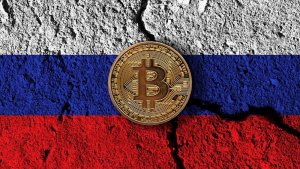Faced with stiffening sanctions over its invasion of Ukraine, Russia is reportedly mulling the idea of accepting Bitcoin or other cryptocurrencies as payment for its international trade. Interfax news agency first reported the news on Friday, citing a high-ranking government official.

“The idea of using digital currencies in transactions for international settlements is being actively discussed,” said Ivan Chebeskov, head of the finance ministry’s financial policy department.
Chebeskov’s remarks suggest that the Russian government and central bank, who pushed towards a blanket ban on cryptos, may be moving closer to settling their differences.
Russia has earlier floated the idea of allowing cryptocurrency to be used as payment for its oil and gas sold to “friendly countries.” At the time, head of energy committee, Pavel Zavalny, said China and Turkey could begin paying for energy in Russian roubles, Chinese yuan, Turkish lira — or even Bitcoin.
According to a report from Russian state news agency TASS, Industry and Trade Minister Denis Manturov said “The question is when it will happen, how it will happen and how it will be regulated. Now both the Central Bank and the government are actively engaged in this.”
Until today, crypto in Russia has existed in a legal gray area. Locals were allowed to buy and exchange cryptocurrencies, but companies and exchanges dealing were often under a close watch by law enforcement agencies. According to industry estimates, the annual volume of crypto transactions in the country is around $5 billion.
Just days before Russia’s invasion of Ukraine, the central bank said it wants to prohibit the use and mining of cryptocurrencies, arguing that they could be used to threaten its monetary policy sovereignty and the country’s financial stability. Further explaining its unfavorable stance against cryptocurrencies, the regulator argued that they could be used to fund terrorism and result in money laundering.
The central bank believes that cryptocurrencies carry the hallmarks of a Ponzi scheme, warning of potential bubbles in the market. Russia’s apex bank also voiced concerns about risks to financial stability due to the high volatile nature of crypto transactions.
Available information shows that many Russian entities and individuals were looking to liquidate their assets to acquire properties in crypto-friendly regions, like the UAE, through crypto.
Putin said earlier this year that cryptocurrencies have a “potential future” as a means of payment. The Russian leader pointed out that crypto money finds more real-world use cases. However, Putin was less sure about the fundamentals that were driving the valuations of cryptocurrencies like Bitcoin.
